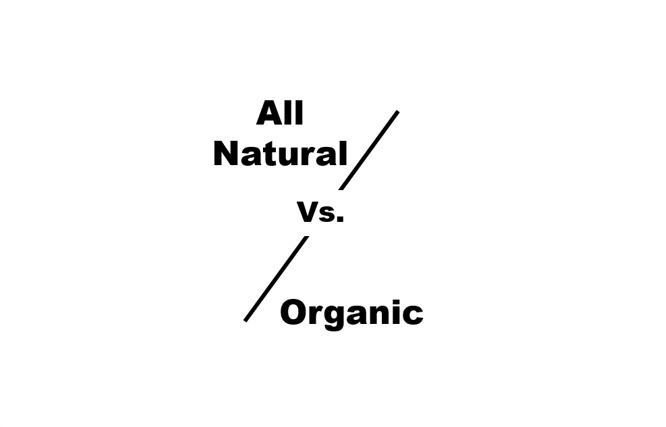Demystifying “All-Natural” and “Organic”

From Farm to Table: Understanding All-Natural vs. Organic Products
In an era where health-conscious choices and environmental concerns dominate our decision-making, the terms "all-natural" and "organic" have become buzzwords, adorning food and product labels. Many consumers view these labels as indicators of a healthier and more sustainable choice.
Understanding the precise meaning and implications of the terms "Alll-Natural" and "Organic" is crucial for making informed decisions.
Let’s demystify the significance, point out their differences, and the regulations that govern them. Whether you're a seasoned shopper or new to the world of conscious consumerism, this article aims to equip you with the knowledge you need to navigate these labels with confidence.

Eating with Clarity: A Consumer's Guide to All-Natural and Organic
The terms "all-natural" and "organic" are often used in the context of food and product labelling, but they have distinct meanings and regulatory implications. Here’s the clarification:
All-Natural:
- "All-natural" typically implies that a product is made from ingredients that are minimally processed and do not contain synthetic additives or artificial components. It suggests that the product is closer to its natural state and doesn't contain artificial colours, flavours, or preservatives.
- However, the term "all-natural" is not strictly defined or regulated by government agencies like the U.S. Food and Drug Administration (FDA). This lack of a standardized definition can lead to confusion and potential misuse by manufacturers, making it important for consumers to read ingredient lists carefully.
Organic:
- "Organic" refers to a specific method of agricultural production and food processing. Organic products are made using organic farming practices, which involve the use of natural processes and materials while avoiding synthetic chemicals and genetically modified organisms (GMOs).
- Organic products are subject to stringent regulations and certification standards, which vary by country. For example, in the United States, the USDA (United States Department of Agriculture) oversees the National Organic Program (NOP) and sets specific standards for organic food products. Organic labelling typically indicates that a product has been produced following these standards.
- Organic products are often labelled with the USDA Organic seal, which has specific designations like "100% Organic," "Organic" (at least 95% organic ingredients), or "Made with Organic Ingredients" (at least 70% organic ingredients). Read about ingredients that sneak onto these labels.
All-Natural and Organic Unravelled
In summary, the key difference between "all-natural" and "organic" lies in the regulatory standards and certifications associated with organic products. "Organic" products adhere to specific guidelines that restrict the use of synthetic chemicals and emphasize sustainable farming practices. "All-natural" is a less regulated term, and its meaning can vary from one product to another, making it important for consumers to carefully assess the ingredients and claims on product labels to ensure they align with their expectations and values.
As consumers, we wield the power to shape our health and the environment through our purchasing decisions. By demystifying the concepts of "all-natural" and "organic," we empower ourselves to make choices that align with our values. Understanding the distinction between these terms enables us to make informed choices that not only benefit our well-being but also support sustainable and environmentally responsible practices.
As you embark on your next shopping trip or explore new products, take a moment to read labels and question the claims made by manufacturers. Let knowledge be your guide, and remember that an educated consumer is a powerful force for positive change in the marketplace.

This Avocado Tree community would love to read your feedback. If you enjoyed this article tell us your thoughts on how the information helped you in the member discussion section below! Login or Subscribe to comment.
Member discussion